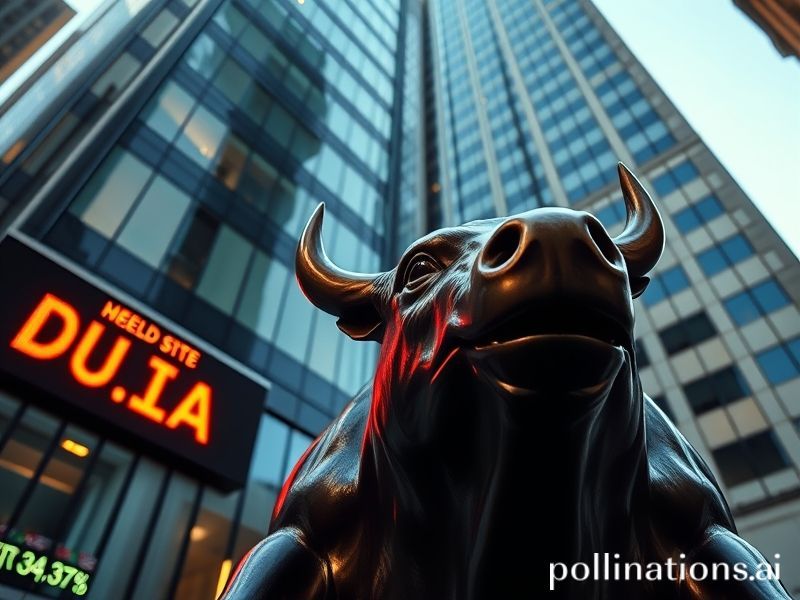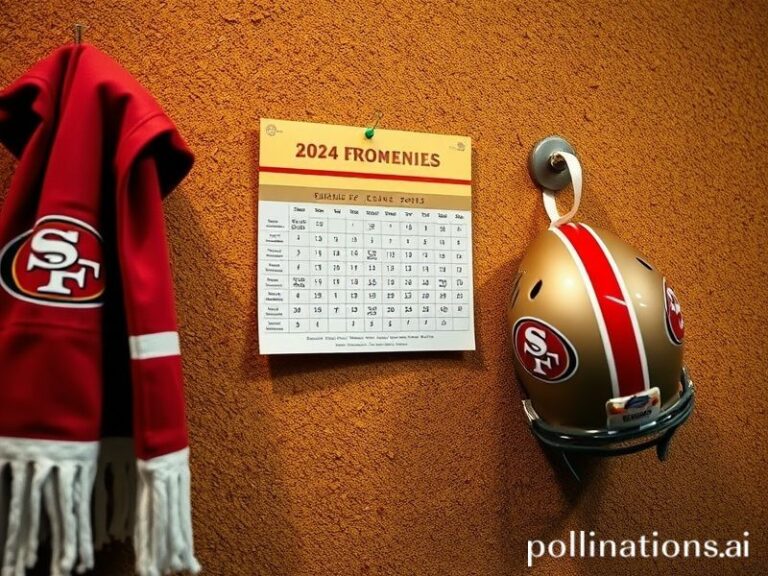Dow Jones: The 30 American Stocks That Make the Whole World Hold Its Breath (and Its Nose)
When the Dow Jones Industrial Average sneezes, the world doesn’t just catch a cold—it starts Googling funeral arrangements and debating which national anthem to play at the wake. Across time zones, from the glass sarcophagi of London’s Canary Wharf to the neon temples of Shanghai’s Lujiazui, traders watch those thirty American blue-chips like anxious relatives monitoring a billionaire uncle’s heart monitor. The ECG line twitches, and suddenly a soybean farmer in Mato Grosso, a pension fund manager in Oslo, and a crypto-bro in Lagos all feel the same existential shiver. Globalisation, it turns out, is just a very expensive group chat where everyone screenshots the same red candle.
Consider Apple, the Dow’s resident trillion-dollar fruit stand. When Tim Cook so much as sighs during an earnings call, rare-earth miners in Inner Mongolia adjust their respirators and whisper a quiet prayer to the ghost of Deng Xiaoping. Foxconn’s dormitories in Zhengzhou—those famously suicide-netted paradises—light up with overtime orders, while shipping lanes from Busan to Rotterdam rearrange themselves like polite guests making room for the alpha yacht. Somewhere, a European Green politician posts an outraged tweet about carbon footprints, then orders a new iPhone anyway. The circle of life, sponsored by supply-chain logistics.
Boeing’s presence on the index provides a darker comic subplot. Each 737 Max headline triggers a domino effect: budget airlines in Jakarta cancel expansion plans, Irish lessors renegotiate lease rates, and Saudi sovereign-wealth fund managers wonder if they should pivot back to camels. Meanwhile, Airbus executives in Toulouse uncork Bordeaux that tastes suspiciously like schadenfreude. Somewhere in Washington, lobbyists write “safety first” on one whiteboard and “shareholder value” on another, then quietly erase the first.
Energy giants Chevron and Exxon Mobil act like the Dow’s two drunk uncles arguing over the last pint at a wake. When oil futures spike—say, because a Gulf prince stubbed his toe on a drone—German environmental ministers clutch their pearls, Indian truck drivers riot over diesel prices, and Japanese utilities fire up mothballed coal plants so politely that they bow while belching carbon. The planet, ever the accommodating host, files the incident under “future famines.”
Even the seemingly innocent consumer staples—Coca-Cola, Walmart, Procter & Gamble—carry geopolitical baggage. Coke sells brown sugar water in 200 countries, yet its quarterly reports double as a soft-power index: when sales sag in Russia, analysts read it as a barometer of anti-American sentiment rather than mere dental hygiene. Walmart’s supply-chain AI knows the price of flip-flops in Bangladesh before the Bangladeshi government does, a fact that delights economists and terrifies labor organizers in equal measure.
The cruel punchline? All thirty Dow components are headquartered within a few subway stops of each other, yet their tentacles wrap the globe like a polite anaconda. When the index rallies, champagne pops from Wall Street to Wallmapu; when it tanks, suicide hotlines in twelve languages update their hold music to something appropriately downtempo. The market, that great equalizer, treats a Namibian diamond cutter and a Connecticut hedge-fund heir to the same exquisite panic.
So tomorrow, when CNBC flashes green or red, remember the choreography behind the pixels: a soybean, a microchip, and a barrel of oil waltzing across borders in perfect 4/4 time, accompanied by the gentle clink of champagne flutes and the distant rumble of collapsing glaciers. The Dow is just thirty stocks, but it’s also every unpaid invoice, every over-leveraged pension, and every algorithm whispering “buy the dip” in Mandarin. In a world where nothing is certain except debt and climate change, the index remains our most reliable barometer of collective delusion—an EKG for a planet with a very expensive heart condition.







